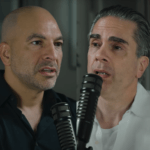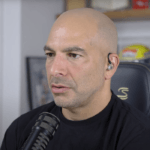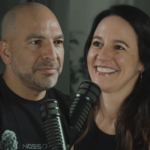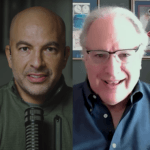Robert Abbott is a six-time Emmy award winner and the director of “The Last Days of Knight,” the behind-the-scenes documentary of legendary coach Bobby Knight, and the events that led to his termination from Indiana University. In this episode, Robert takes us through his investigative journey, which revealed cautionary tales of a winning at all costs environment—how pain often gets left in the wake of unchecked anger, ego, and perfectionism. Robert reflects on Knight’s legacy and extracts lessons in self-awareness and accountability that can be applied to ensure history doesn’t repeat itself.
Subscribe on: APPLE PODCASTS | RSS | GOOGLE | OVERCAST | STITCHER
We discuss:
- Robert’s career covering sports and interesting athletes (2:30);
- Robert’s early impression of Bobby Knight’s controversial persona (10:15);
- The journalistic work that uniquely prepared Robert for his Bobby Knight story (13:30);
- The cost of excellence in sports—cautionary tales of ‘greatness at any cost’ (19:15);
- Knight’s coaching style, waning success in the 90s, and what put him on Robert’s radar (25:30);
- Three alarming accounts from a former player (Neil Reed) that launched Robert’s investigation into Bobby Knight (35:15);
- The “win-first” environment at Indiana that provided cover for Knight’s toxic behavior (44:45);
- Knight’s ego swells—a shift from team-first to “I” and “me” (53:00);
- How patience, honesty, and gaining trust with his sources paid off in his reporting on Bobby Knight (1:01:30);
- The vicious cycle and anger and shame, and why Bobby Knight is so interesting to Peter (1:08:00);
- Releasing the choking tape—Breaking open the Knight story, vindicating his earlier reporting, and the most powerful moment Robert has ever witnessed in his journalistic career (1:20:00);
- The bittersweet story of Neil Reed—triumph, PTSD, and breaking the cycle of pain (1:43:15);
- Examining Bobby Knight’s legacy, and how society can avoid a repeat of similar devastating situations (1:57:30);
- Final thoughts on Bobby Knight and the pain left in his wake (2:08:00); and
- More.
Robert’s career covering sports and interesting athletes [2:30]
Robert’s documentary on Bobby Knight: The Last Days of Knight
***
Early career
What drew Robert to journalism?
- Always a fan of sports
- Previously was a competitive golfer at Florida State University (played in Future Masters, Junior Orange Bowl, Tournament of Champions, etc.)
- Post golf career, got into media performance with the idea of being an on-air sportscaster
- Took a journalism class and was surprised how much it interested him
- His first job was at the local TV station as a cameraman, editor, and on-air reporter
- Eventually got hired at CNN as an associate producer but gravitated into becoming a storyteller
- He started doing profiles of athletes—traveling around the country and spending time with people
“I love the psychology of sports, what makes someone great, what they have to sacrifice to give it up. And that’s kind of what shaped my early career at CNN.” —Robert Abbott
Ever a letdown when meeting an athlete you admired?
- Countless times, says Robert
- He grew up watching the Olympics, (Olga Korbut, Nadia Comaneci)
- He was very fascinated by their human stories, but to become great, many of the olympians had to be one dimensional (i.e., not that interesting)
- Robert is drawn to people who have a story to tell
- Examples:
- A swimmer, Gary Hall Jr. whom Robert did a piece about
- The Jamaican bobsled team for the 1992 winter Olympics
- Did a story on Prince Albert with the Monaco bobsled team
- Latvian bobsled team after communism had just ended
Robert’s early impression of Bobby Knight’s controversial persona [10:15]
By 1991, Bobby Knight had won three national championships at Indiana (1976, 1981, 1987), and he had historic seasons in 1975 (one loss) and 1976 when they went undefeated, plus he coached the 1984 Olympic men’s team to a gold medal
Robert’s attitude and opinion towards Bobby Knight in 1991:
- Robert vividly remembers reading John Feinstein‘s book from 1987, A Season on the Brink, which painted a picture where Knight would relentlessly ride by his players
- One story about a player Daryl Thomas where Knight called him a ‘pussy’ and put a box of tampons in his locker
- Feinstein ends the book with a line that says, “Do the ends justify the means?”
- The answer seemed to be “yes” in Robert’s mind considering the success Knight had at the time
“I had no idea that 13 years later, my boss would give me an assignment that ultimately I would be asking that same question and presenting it to the country.”
{end of show notes preview}
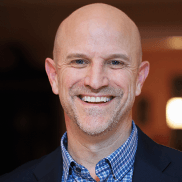
Robert Abbott
Robert Abbott is a six-time Emmy Award winning producer and director with 30+ years experience in the sports and entertainment industry. This is his second film for ESPN’s acclaimed 30 for 30 series and the first for his company Hey Abbott! Entertainment. Abbott pitched the 30 for 30 film, Catholics vs. Convicts, and was the film’s executive producer in 2016. Abbott spent 11 years at ESPN , from 2001-2012, and during that time was instrumental in creating series like E60 and Top 5 Reasons You Can’t Blame. He also helped create and oversee the productions of Who’s #1? and The Headlines for ESPN25, the network’s 25th anniversary project. Prior to joining ESPN Abbott spent 14 years at CNN where he produced the award-winning documentaries, Field of Screams, Battle of the Sexes and The Moses Project.
Abbott is a graduate of Florida State University and lives in Avon, CT with his wife Jennifer and their three sons. [espn.com]


